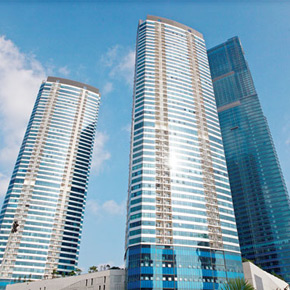The new service fees will be based on the reality of the market and negotiated with the local residents.
Heated disputes between developers and residents in high-rise apartment buildings in Hanoi could soon be over after a new level of service fees is crafted by the capital’s Construction Department.
Tran Hop Dung, Hanoi Construction Department’s chief of Economic Management Division, said disputes related to service fees was the main conflict between developers and residents, especially with foreign-invested projects and the new fees would be released in October.

He said the department was collecting opinions from high-rise apartment residents in Hanoi to have database to set up these fees. “The new service fees will be based on the reality of the market and negotiated with the local residents,” Dung said.
However, Dung said the new set fees would be the minimum level for mid-range apartment buildings only. For high-end projects the final fees could be decided via negotiations between developers and the resident’s representative board.
“Developers will have to apply fees whenever 50 per cent or more of residents agreed with the proposed fees,” Dung said. Disputes between residents and developers have been heating up for years with the long running dispute between the developer and residents of Keangnam Hanoi Landmark Tower creating headlines.
Keangnam Vina imposed to collect the fee of VND17,000 ($0.8) per square metre per month, however its residents refused to pay, claiming that the fee was much more higher than those regulated by the Hanoi People’s Committee, at VND4,000 ($0.19) per square metre.
Keangnam claimed the VND4,000 per square metre management fee applied to normal high-rise buildings, while Keangnam Hanoi Landmark Tower had the most modern facilities and advanced technologies so it followed the fee had to be higher.
The same disputes have occurred in domestic projects such as Linh Dam residential area, 96 Dinh Cong or NO5 Tran Duy Hung. Especially it also occurred in foreign-invested projects such Golden West Lake, Ciputra, Chelsea Park and Sky City Nguyen Hong Minh, director of Property Management Company - a management services supplier, said the lack of a legal framework for dealing with disputes was the main cause for this rising problem.
“The government should set up a standard system for both developers and residents to follow as soon as possible, thus avoiding the current situation where every developer has to solve his own problems,” Minh said. For management companies, the most important factor was that operations had to be transparent and subject to inspection.
“Management companies must consider residents their real customers to limit disputes and deliver the best possible services to the residents,” Minh said. Recently it was suggested the Ministry of Construction set up a law to deal with this issue. Tran Vu Hai, managing lawyer of Hanoi Law Company, said recent disputes had harmed the market.
He said a high-rise apartment law would focus on conditions developers must meet before and after starting projects, arbitration for disputes, apartment management cooperatives or apartment user associations.
Theo Vietnam Investment Review








